FYA001 Skills Development: Challenges of Elderly Care in Society
VerifiedAdded on 2023/04/03
|7
|1698
|361
Essay
AI Summary
This essay identifies and discusses the multifaceted challenges that caring for the elderly poses in today's society. It explores the fiscal and macroeconomic strains on governments due to increased expenditure on pensions, social benefits, and healthcare, particularly in developing countries. The essay also delves into the physical, emotional, and psychological burdens faced by caregivers, relatives, and families, highlighting the stress associated with unpredictable elderly behavior and the financial strain of meeting their needs. Furthermore, it addresses the challenges within healthcare, including the lack of caregiver knowledge about elderly-related illnesses and the rising costs of providing quality healthcare services. The essay concludes that caring for the elderly has become a complex responsibility with significant impacts on family wellbeing, healthcare systems, and national economies, particularly in countries with aging populations like the UK.
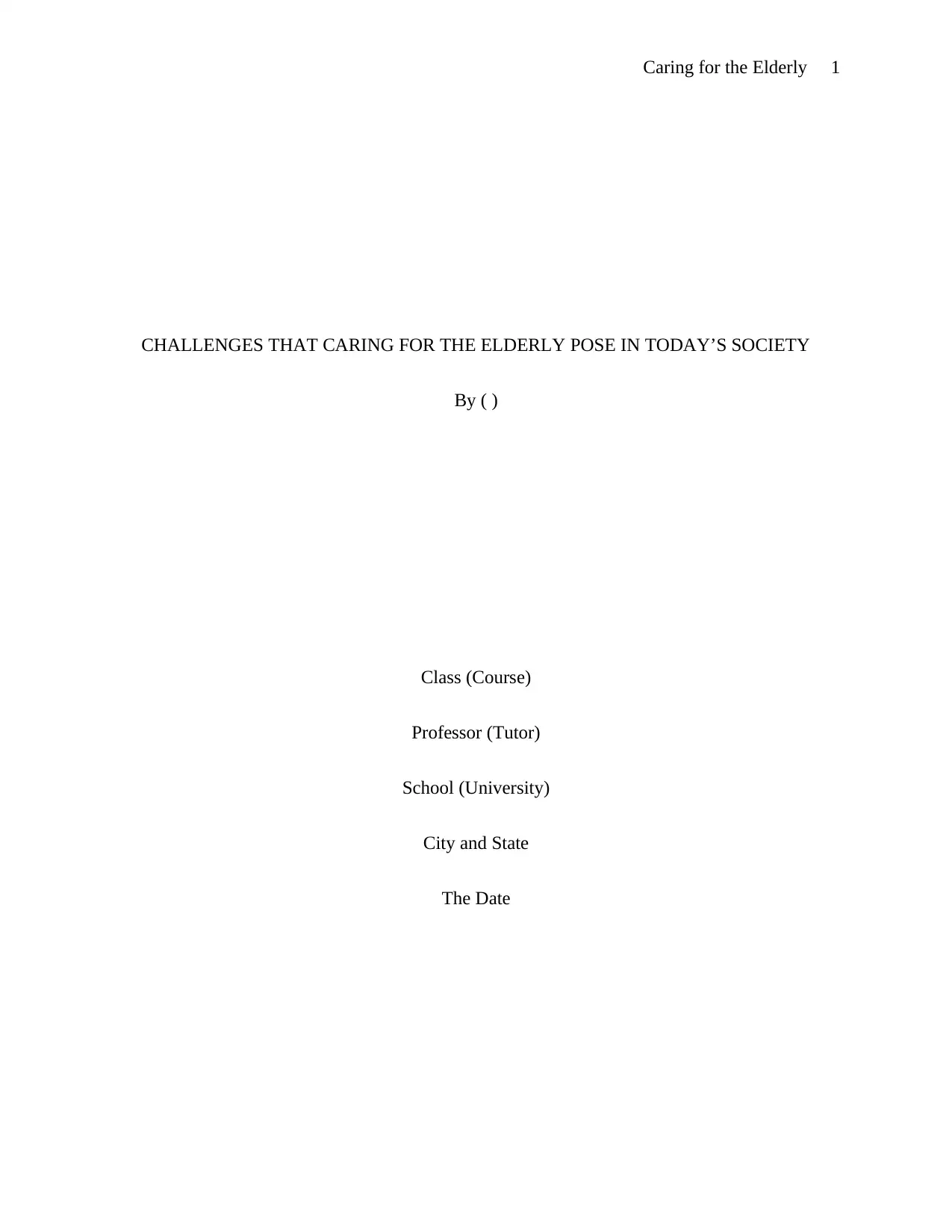
Caring for the Elderly 1
CHALLENGES THAT CARING FOR THE ELDERLY POSE IN TODAY’S SOCIETY
By ( )
Class (Course)
Professor (Tutor)
School (University)
City and State
The Date
CHALLENGES THAT CARING FOR THE ELDERLY POSE IN TODAY’S SOCIETY
By ( )
Class (Course)
Professor (Tutor)
School (University)
City and State
The Date
Paraphrase This Document
Need a fresh take? Get an instant paraphrase of this document with our AI Paraphraser
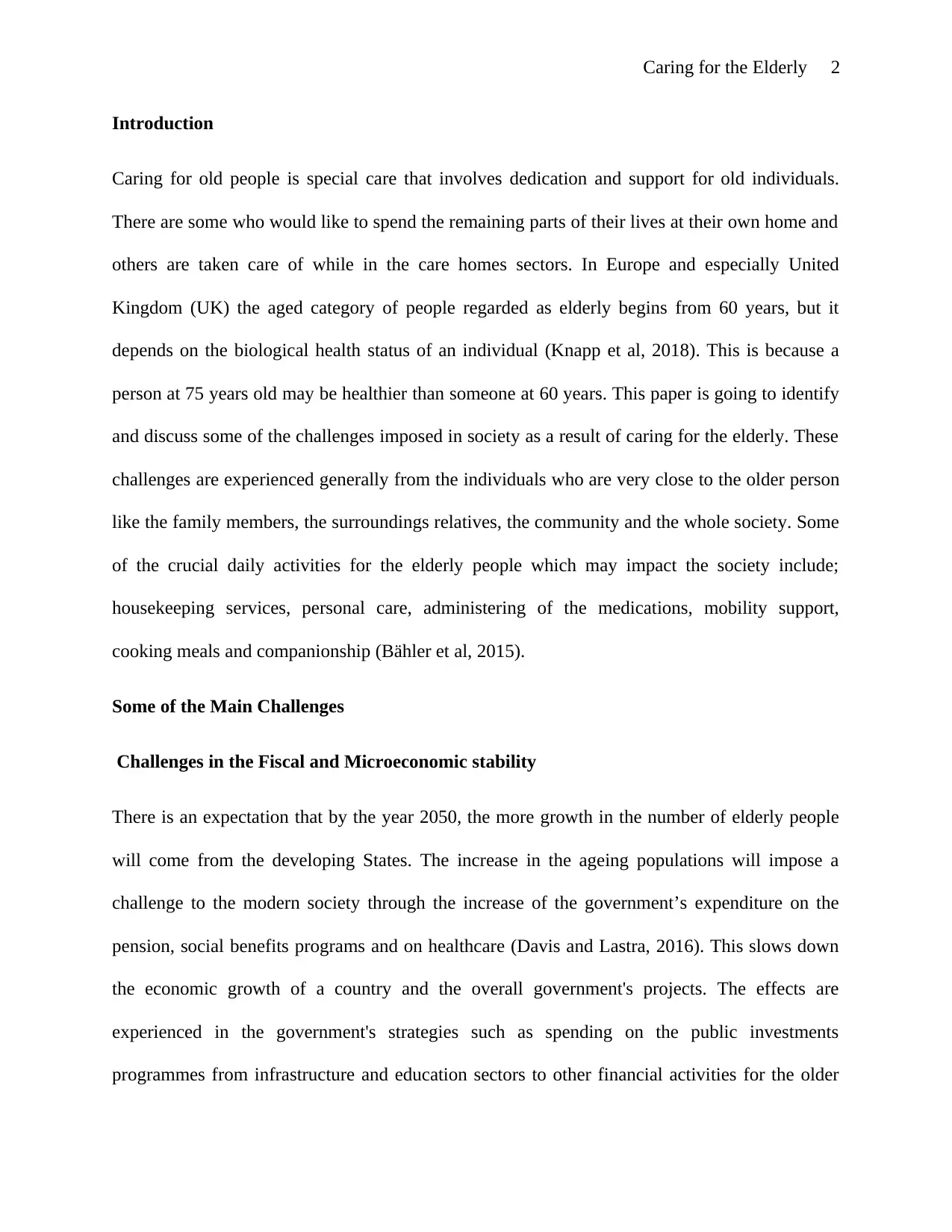
Caring for the Elderly 2
Introduction
Caring for old people is special care that involves dedication and support for old individuals.
There are some who would like to spend the remaining parts of their lives at their own home and
others are taken care of while in the care homes sectors. In Europe and especially United
Kingdom (UK) the aged category of people regarded as elderly begins from 60 years, but it
depends on the biological health status of an individual (Knapp et al, 2018). This is because a
person at 75 years old may be healthier than someone at 60 years. This paper is going to identify
and discuss some of the challenges imposed in society as a result of caring for the elderly. These
challenges are experienced generally from the individuals who are very close to the older person
like the family members, the surroundings relatives, the community and the whole society. Some
of the crucial daily activities for the elderly people which may impact the society include;
housekeeping services, personal care, administering of the medications, mobility support,
cooking meals and companionship (Bähler et al, 2015).
Some of the Main Challenges
Challenges in the Fiscal and Microeconomic stability
There is an expectation that by the year 2050, the more growth in the number of elderly people
will come from the developing States. The increase in the ageing populations will impose a
challenge to the modern society through the increase of the government’s expenditure on the
pension, social benefits programs and on healthcare (Davis and Lastra, 2016). This slows down
the economic growth of a country and the overall government's projects. The effects are
experienced in the government's strategies such as spending on the public investments
programmes from infrastructure and education sectors to other financial activities for the older
Introduction
Caring for old people is special care that involves dedication and support for old individuals.
There are some who would like to spend the remaining parts of their lives at their own home and
others are taken care of while in the care homes sectors. In Europe and especially United
Kingdom (UK) the aged category of people regarded as elderly begins from 60 years, but it
depends on the biological health status of an individual (Knapp et al, 2018). This is because a
person at 75 years old may be healthier than someone at 60 years. This paper is going to identify
and discuss some of the challenges imposed in society as a result of caring for the elderly. These
challenges are experienced generally from the individuals who are very close to the older person
like the family members, the surroundings relatives, the community and the whole society. Some
of the crucial daily activities for the elderly people which may impact the society include;
housekeeping services, personal care, administering of the medications, mobility support,
cooking meals and companionship (Bähler et al, 2015).
Some of the Main Challenges
Challenges in the Fiscal and Microeconomic stability
There is an expectation that by the year 2050, the more growth in the number of elderly people
will come from the developing States. The increase in the ageing populations will impose a
challenge to the modern society through the increase of the government’s expenditure on the
pension, social benefits programs and on healthcare (Davis and Lastra, 2016). This slows down
the economic growth of a country and the overall government's projects. The effects are
experienced in the government's strategies such as spending on the public investments
programmes from infrastructure and education sectors to other financial activities for the older
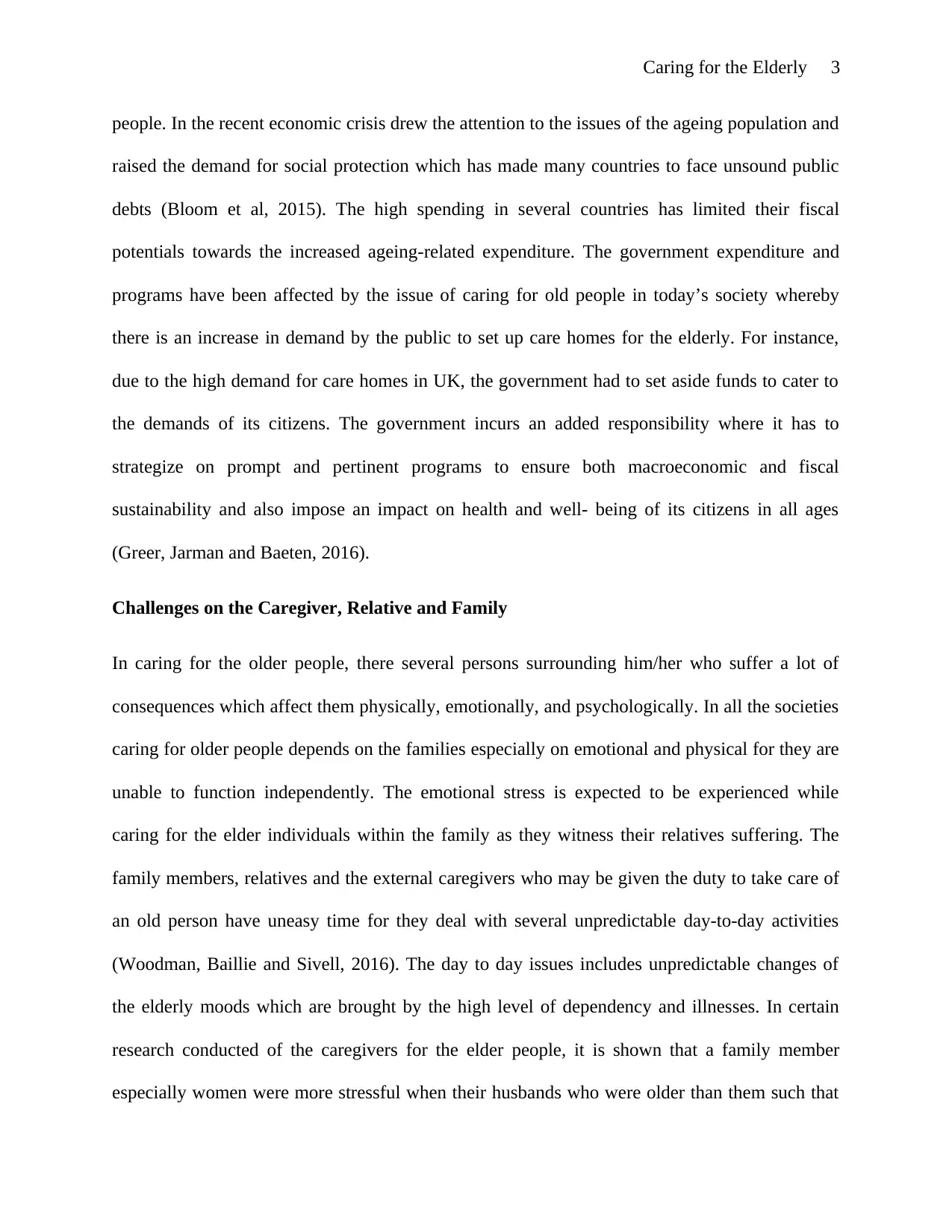
Caring for the Elderly 3
people. In the recent economic crisis drew the attention to the issues of the ageing population and
raised the demand for social protection which has made many countries to face unsound public
debts (Bloom et al, 2015). The high spending in several countries has limited their fiscal
potentials towards the increased ageing-related expenditure. The government expenditure and
programs have been affected by the issue of caring for old people in today’s society whereby
there is an increase in demand by the public to set up care homes for the elderly. For instance,
due to the high demand for care homes in UK, the government had to set aside funds to cater to
the demands of its citizens. The government incurs an added responsibility where it has to
strategize on prompt and pertinent programs to ensure both macroeconomic and fiscal
sustainability and also impose an impact on health and well- being of its citizens in all ages
(Greer, Jarman and Baeten, 2016).
Challenges on the Caregiver, Relative and Family
In caring for the older people, there several persons surrounding him/her who suffer a lot of
consequences which affect them physically, emotionally, and psychologically. In all the societies
caring for older people depends on the families especially on emotional and physical for they are
unable to function independently. The emotional stress is expected to be experienced while
caring for the elder individuals within the family as they witness their relatives suffering. The
family members, relatives and the external caregivers who may be given the duty to take care of
an old person have uneasy time for they deal with several unpredictable day-to-day activities
(Woodman, Baillie and Sivell, 2016). The day to day issues includes unpredictable changes of
the elderly moods which are brought by the high level of dependency and illnesses. In certain
research conducted of the caregivers for the elder people, it is shown that a family member
especially women were more stressful when their husbands who were older than them such that
people. In the recent economic crisis drew the attention to the issues of the ageing population and
raised the demand for social protection which has made many countries to face unsound public
debts (Bloom et al, 2015). The high spending in several countries has limited their fiscal
potentials towards the increased ageing-related expenditure. The government expenditure and
programs have been affected by the issue of caring for old people in today’s society whereby
there is an increase in demand by the public to set up care homes for the elderly. For instance,
due to the high demand for care homes in UK, the government had to set aside funds to cater to
the demands of its citizens. The government incurs an added responsibility where it has to
strategize on prompt and pertinent programs to ensure both macroeconomic and fiscal
sustainability and also impose an impact on health and well- being of its citizens in all ages
(Greer, Jarman and Baeten, 2016).
Challenges on the Caregiver, Relative and Family
In caring for the older people, there several persons surrounding him/her who suffer a lot of
consequences which affect them physically, emotionally, and psychologically. In all the societies
caring for older people depends on the families especially on emotional and physical for they are
unable to function independently. The emotional stress is expected to be experienced while
caring for the elder individuals within the family as they witness their relatives suffering. The
family members, relatives and the external caregivers who may be given the duty to take care of
an old person have uneasy time for they deal with several unpredictable day-to-day activities
(Woodman, Baillie and Sivell, 2016). The day to day issues includes unpredictable changes of
the elderly moods which are brought by the high level of dependency and illnesses. In certain
research conducted of the caregivers for the elder people, it is shown that a family member
especially women were more stressful when their husbands who were older than them such that
⊘ This is a preview!⊘
Do you want full access?
Subscribe today to unlock all pages.

Trusted by 1+ million students worldwide
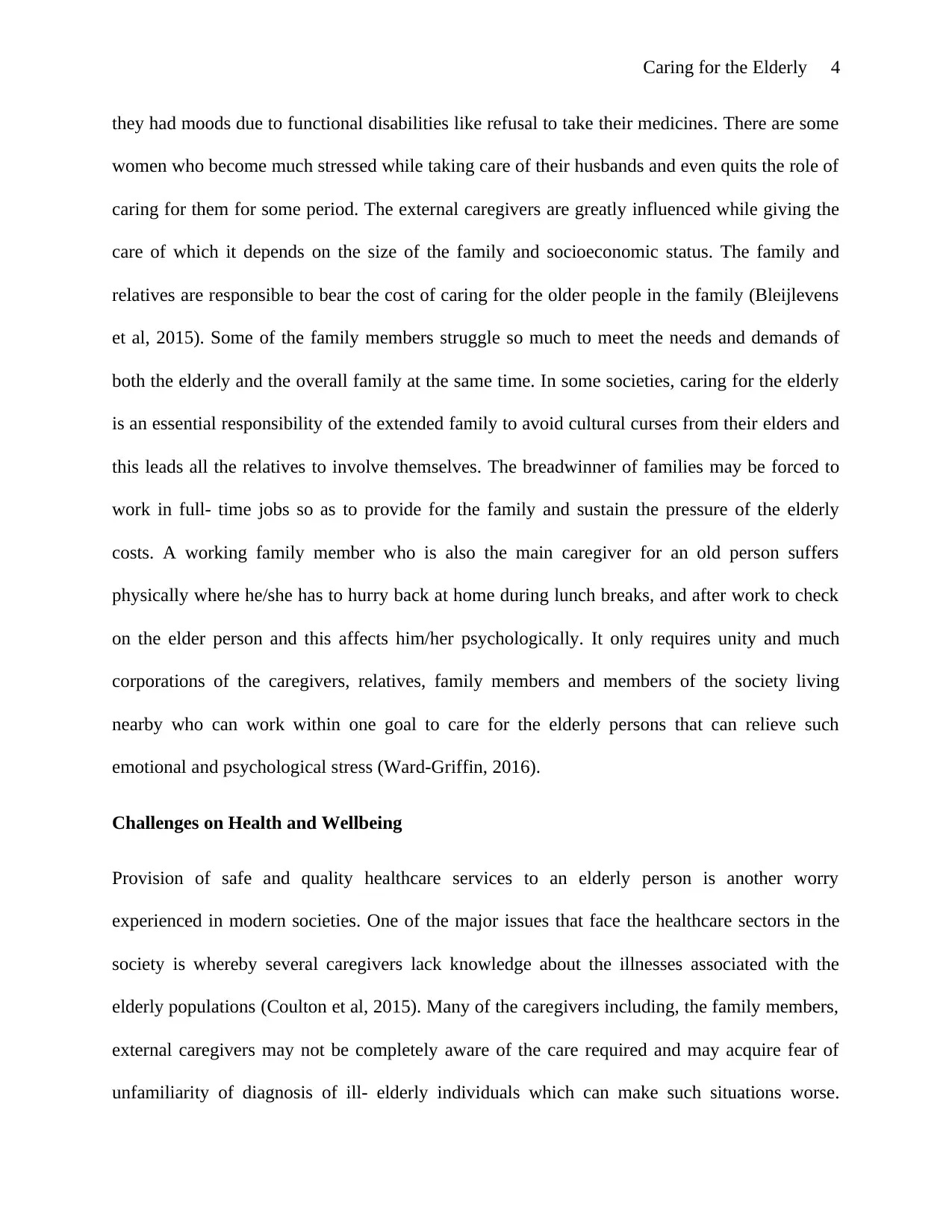
Caring for the Elderly 4
they had moods due to functional disabilities like refusal to take their medicines. There are some
women who become much stressed while taking care of their husbands and even quits the role of
caring for them for some period. The external caregivers are greatly influenced while giving the
care of which it depends on the size of the family and socioeconomic status. The family and
relatives are responsible to bear the cost of caring for the older people in the family (Bleijlevens
et al, 2015). Some of the family members struggle so much to meet the needs and demands of
both the elderly and the overall family at the same time. In some societies, caring for the elderly
is an essential responsibility of the extended family to avoid cultural curses from their elders and
this leads all the relatives to involve themselves. The breadwinner of families may be forced to
work in full- time jobs so as to provide for the family and sustain the pressure of the elderly
costs. A working family member who is also the main caregiver for an old person suffers
physically where he/she has to hurry back at home during lunch breaks, and after work to check
on the elder person and this affects him/her psychologically. It only requires unity and much
corporations of the caregivers, relatives, family members and members of the society living
nearby who can work within one goal to care for the elderly persons that can relieve such
emotional and psychological stress (Ward-Griffin, 2016).
Challenges on Health and Wellbeing
Provision of safe and quality healthcare services to an elderly person is another worry
experienced in modern societies. One of the major issues that face the healthcare sectors in the
society is whereby several caregivers lack knowledge about the illnesses associated with the
elderly populations (Coulton et al, 2015). Many of the caregivers including, the family members,
external caregivers may not be completely aware of the care required and may acquire fear of
unfamiliarity of diagnosis of ill- elderly individuals which can make such situations worse.
they had moods due to functional disabilities like refusal to take their medicines. There are some
women who become much stressed while taking care of their husbands and even quits the role of
caring for them for some period. The external caregivers are greatly influenced while giving the
care of which it depends on the size of the family and socioeconomic status. The family and
relatives are responsible to bear the cost of caring for the older people in the family (Bleijlevens
et al, 2015). Some of the family members struggle so much to meet the needs and demands of
both the elderly and the overall family at the same time. In some societies, caring for the elderly
is an essential responsibility of the extended family to avoid cultural curses from their elders and
this leads all the relatives to involve themselves. The breadwinner of families may be forced to
work in full- time jobs so as to provide for the family and sustain the pressure of the elderly
costs. A working family member who is also the main caregiver for an old person suffers
physically where he/she has to hurry back at home during lunch breaks, and after work to check
on the elder person and this affects him/her psychologically. It only requires unity and much
corporations of the caregivers, relatives, family members and members of the society living
nearby who can work within one goal to care for the elderly persons that can relieve such
emotional and psychological stress (Ward-Griffin, 2016).
Challenges on Health and Wellbeing
Provision of safe and quality healthcare services to an elderly person is another worry
experienced in modern societies. One of the major issues that face the healthcare sectors in the
society is whereby several caregivers lack knowledge about the illnesses associated with the
elderly populations (Coulton et al, 2015). Many of the caregivers including, the family members,
external caregivers may not be completely aware of the care required and may acquire fear of
unfamiliarity of diagnosis of ill- elderly individuals which can make such situations worse.
Paraphrase This Document
Need a fresh take? Get an instant paraphrase of this document with our AI Paraphraser
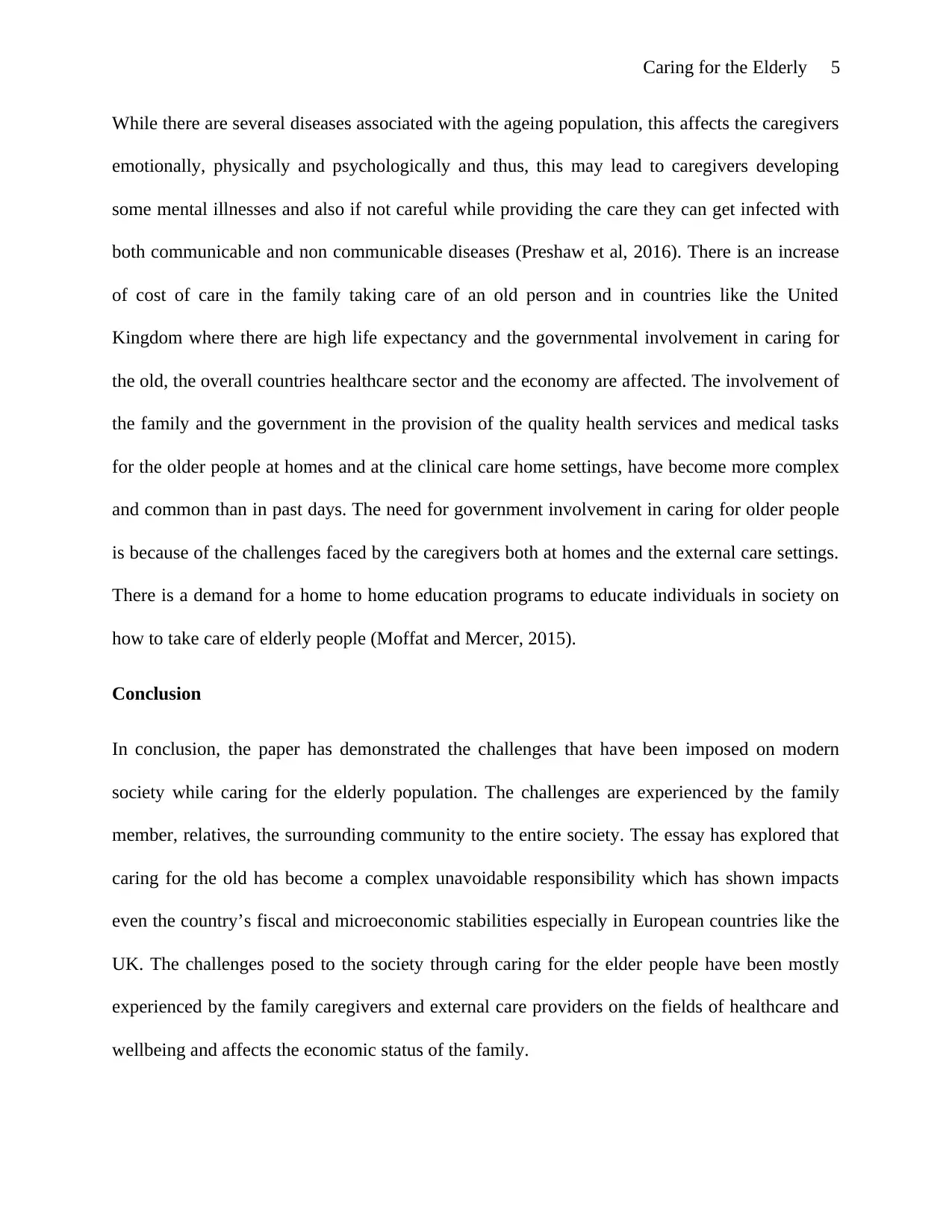
Caring for the Elderly 5
While there are several diseases associated with the ageing population, this affects the caregivers
emotionally, physically and psychologically and thus, this may lead to caregivers developing
some mental illnesses and also if not careful while providing the care they can get infected with
both communicable and non communicable diseases (Preshaw et al, 2016). There is an increase
of cost of care in the family taking care of an old person and in countries like the United
Kingdom where there are high life expectancy and the governmental involvement in caring for
the old, the overall countries healthcare sector and the economy are affected. The involvement of
the family and the government in the provision of the quality health services and medical tasks
for the older people at homes and at the clinical care home settings, have become more complex
and common than in past days. The need for government involvement in caring for older people
is because of the challenges faced by the caregivers both at homes and the external care settings.
There is a demand for a home to home education programs to educate individuals in society on
how to take care of elderly people (Moffat and Mercer, 2015).
Conclusion
In conclusion, the paper has demonstrated the challenges that have been imposed on modern
society while caring for the elderly population. The challenges are experienced by the family
member, relatives, the surrounding community to the entire society. The essay has explored that
caring for the old has become a complex unavoidable responsibility which has shown impacts
even the country’s fiscal and microeconomic stabilities especially in European countries like the
UK. The challenges posed to the society through caring for the elder people have been mostly
experienced by the family caregivers and external care providers on the fields of healthcare and
wellbeing and affects the economic status of the family.
While there are several diseases associated with the ageing population, this affects the caregivers
emotionally, physically and psychologically and thus, this may lead to caregivers developing
some mental illnesses and also if not careful while providing the care they can get infected with
both communicable and non communicable diseases (Preshaw et al, 2016). There is an increase
of cost of care in the family taking care of an old person and in countries like the United
Kingdom where there are high life expectancy and the governmental involvement in caring for
the old, the overall countries healthcare sector and the economy are affected. The involvement of
the family and the government in the provision of the quality health services and medical tasks
for the older people at homes and at the clinical care home settings, have become more complex
and common than in past days. The need for government involvement in caring for older people
is because of the challenges faced by the caregivers both at homes and the external care settings.
There is a demand for a home to home education programs to educate individuals in society on
how to take care of elderly people (Moffat and Mercer, 2015).
Conclusion
In conclusion, the paper has demonstrated the challenges that have been imposed on modern
society while caring for the elderly population. The challenges are experienced by the family
member, relatives, the surrounding community to the entire society. The essay has explored that
caring for the old has become a complex unavoidable responsibility which has shown impacts
even the country’s fiscal and microeconomic stabilities especially in European countries like the
UK. The challenges posed to the society through caring for the elder people have been mostly
experienced by the family caregivers and external care providers on the fields of healthcare and
wellbeing and affects the economic status of the family.
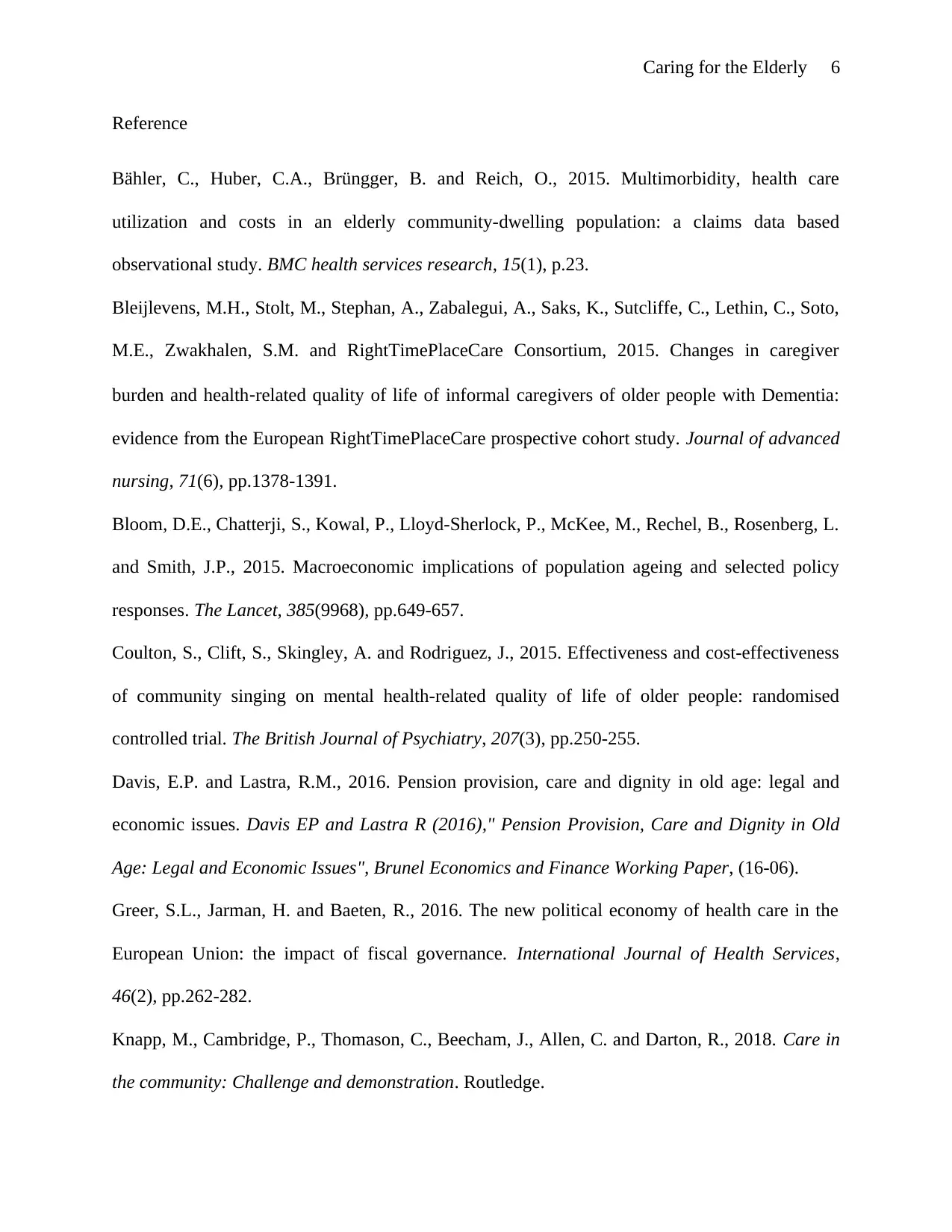
Caring for the Elderly 6
Reference
Bähler, C., Huber, C.A., Brüngger, B. and Reich, O., 2015. Multimorbidity, health care
utilization and costs in an elderly community-dwelling population: a claims data based
observational study. BMC health services research, 15(1), p.23.
Bleijlevens, M.H., Stolt, M., Stephan, A., Zabalegui, A., Saks, K., Sutcliffe, C., Lethin, C., Soto,
M.E., Zwakhalen, S.M. and RightTimePlaceCare Consortium, 2015. Changes in caregiver
burden and health‐related quality of life of informal caregivers of older people with Dementia:
evidence from the European RightTimePlaceCare prospective cohort study. Journal of advanced
nursing, 71(6), pp.1378-1391.
Bloom, D.E., Chatterji, S., Kowal, P., Lloyd-Sherlock, P., McKee, M., Rechel, B., Rosenberg, L.
and Smith, J.P., 2015. Macroeconomic implications of population ageing and selected policy
responses. The Lancet, 385(9968), pp.649-657.
Coulton, S., Clift, S., Skingley, A. and Rodriguez, J., 2015. Effectiveness and cost-effectiveness
of community singing on mental health-related quality of life of older people: randomised
controlled trial. The British Journal of Psychiatry, 207(3), pp.250-255.
Davis, E.P. and Lastra, R.M., 2016. Pension provision, care and dignity in old age: legal and
economic issues. Davis EP and Lastra R (2016)," Pension Provision, Care and Dignity in Old
Age: Legal and Economic Issues", Brunel Economics and Finance Working Paper, (16-06).
Greer, S.L., Jarman, H. and Baeten, R., 2016. The new political economy of health care in the
European Union: the impact of fiscal governance. International Journal of Health Services,
46(2), pp.262-282.
Knapp, M., Cambridge, P., Thomason, C., Beecham, J., Allen, C. and Darton, R., 2018. Care in
the community: Challenge and demonstration. Routledge.
Reference
Bähler, C., Huber, C.A., Brüngger, B. and Reich, O., 2015. Multimorbidity, health care
utilization and costs in an elderly community-dwelling population: a claims data based
observational study. BMC health services research, 15(1), p.23.
Bleijlevens, M.H., Stolt, M., Stephan, A., Zabalegui, A., Saks, K., Sutcliffe, C., Lethin, C., Soto,
M.E., Zwakhalen, S.M. and RightTimePlaceCare Consortium, 2015. Changes in caregiver
burden and health‐related quality of life of informal caregivers of older people with Dementia:
evidence from the European RightTimePlaceCare prospective cohort study. Journal of advanced
nursing, 71(6), pp.1378-1391.
Bloom, D.E., Chatterji, S., Kowal, P., Lloyd-Sherlock, P., McKee, M., Rechel, B., Rosenberg, L.
and Smith, J.P., 2015. Macroeconomic implications of population ageing and selected policy
responses. The Lancet, 385(9968), pp.649-657.
Coulton, S., Clift, S., Skingley, A. and Rodriguez, J., 2015. Effectiveness and cost-effectiveness
of community singing on mental health-related quality of life of older people: randomised
controlled trial. The British Journal of Psychiatry, 207(3), pp.250-255.
Davis, E.P. and Lastra, R.M., 2016. Pension provision, care and dignity in old age: legal and
economic issues. Davis EP and Lastra R (2016)," Pension Provision, Care and Dignity in Old
Age: Legal and Economic Issues", Brunel Economics and Finance Working Paper, (16-06).
Greer, S.L., Jarman, H. and Baeten, R., 2016. The new political economy of health care in the
European Union: the impact of fiscal governance. International Journal of Health Services,
46(2), pp.262-282.
Knapp, M., Cambridge, P., Thomason, C., Beecham, J., Allen, C. and Darton, R., 2018. Care in
the community: Challenge and demonstration. Routledge.
⊘ This is a preview!⊘
Do you want full access?
Subscribe today to unlock all pages.

Trusted by 1+ million students worldwide
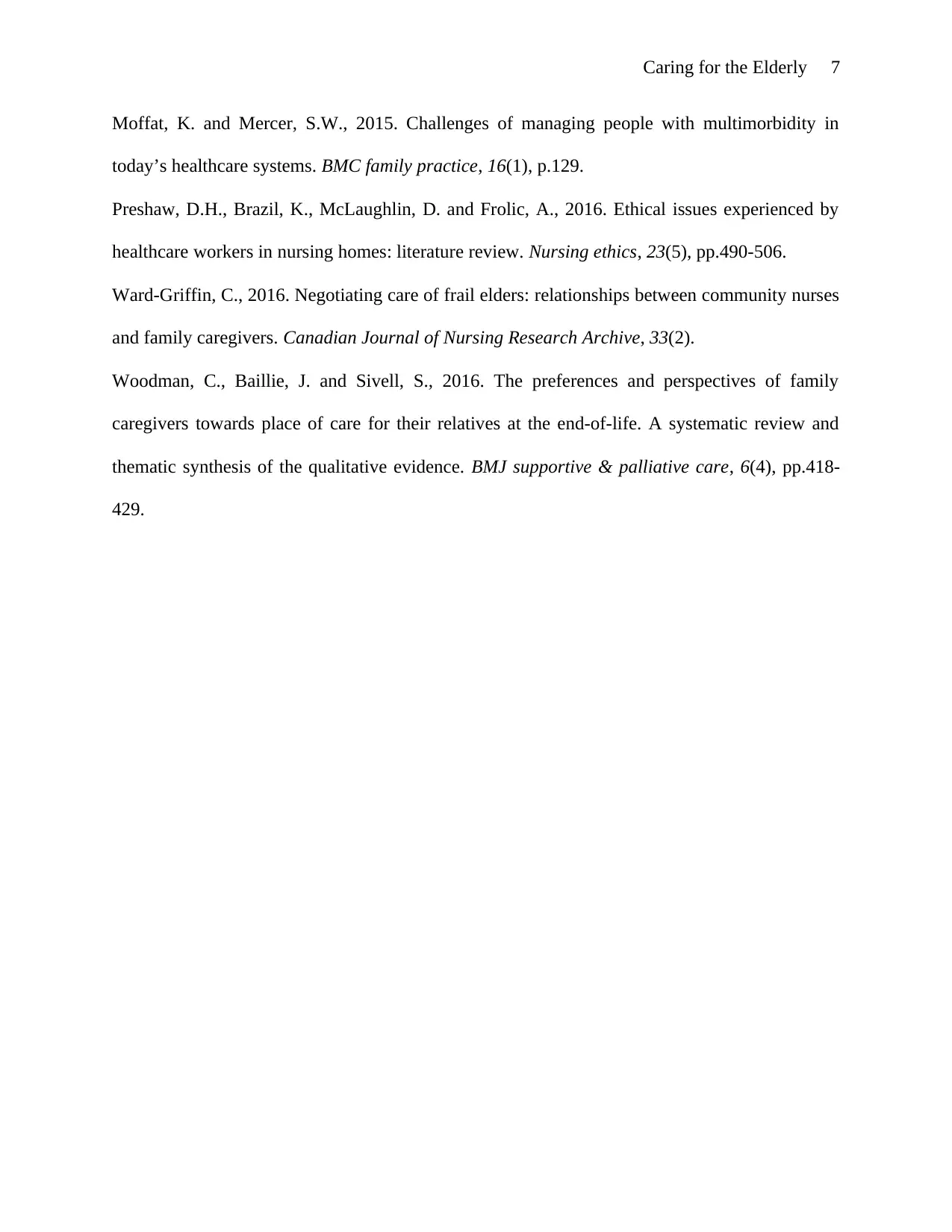
Caring for the Elderly 7
Moffat, K. and Mercer, S.W., 2015. Challenges of managing people with multimorbidity in
today’s healthcare systems. BMC family practice, 16(1), p.129.
Preshaw, D.H., Brazil, K., McLaughlin, D. and Frolic, A., 2016. Ethical issues experienced by
healthcare workers in nursing homes: literature review. Nursing ethics, 23(5), pp.490-506.
Ward-Griffin, C., 2016. Negotiating care of frail elders: relationships between community nurses
and family caregivers. Canadian Journal of Nursing Research Archive, 33(2).
Woodman, C., Baillie, J. and Sivell, S., 2016. The preferences and perspectives of family
caregivers towards place of care for their relatives at the end-of-life. A systematic review and
thematic synthesis of the qualitative evidence. BMJ supportive & palliative care, 6(4), pp.418-
429.
Moffat, K. and Mercer, S.W., 2015. Challenges of managing people with multimorbidity in
today’s healthcare systems. BMC family practice, 16(1), p.129.
Preshaw, D.H., Brazil, K., McLaughlin, D. and Frolic, A., 2016. Ethical issues experienced by
healthcare workers in nursing homes: literature review. Nursing ethics, 23(5), pp.490-506.
Ward-Griffin, C., 2016. Negotiating care of frail elders: relationships between community nurses
and family caregivers. Canadian Journal of Nursing Research Archive, 33(2).
Woodman, C., Baillie, J. and Sivell, S., 2016. The preferences and perspectives of family
caregivers towards place of care for their relatives at the end-of-life. A systematic review and
thematic synthesis of the qualitative evidence. BMJ supportive & palliative care, 6(4), pp.418-
429.
1 out of 7
Related Documents
Your All-in-One AI-Powered Toolkit for Academic Success.
+13062052269
info@desklib.com
Available 24*7 on WhatsApp / Email
![[object Object]](/_next/static/media/star-bottom.7253800d.svg)
Unlock your academic potential
Copyright © 2020–2026 A2Z Services. All Rights Reserved. Developed and managed by ZUCOL.





